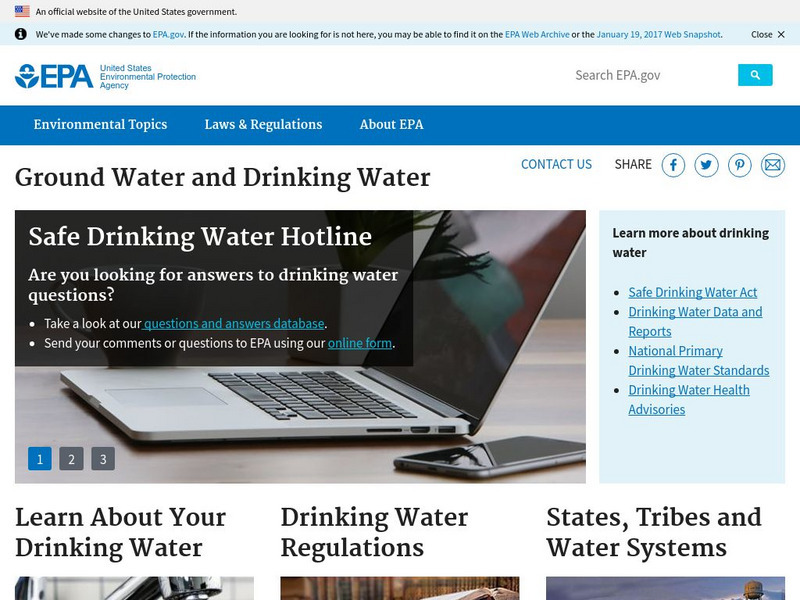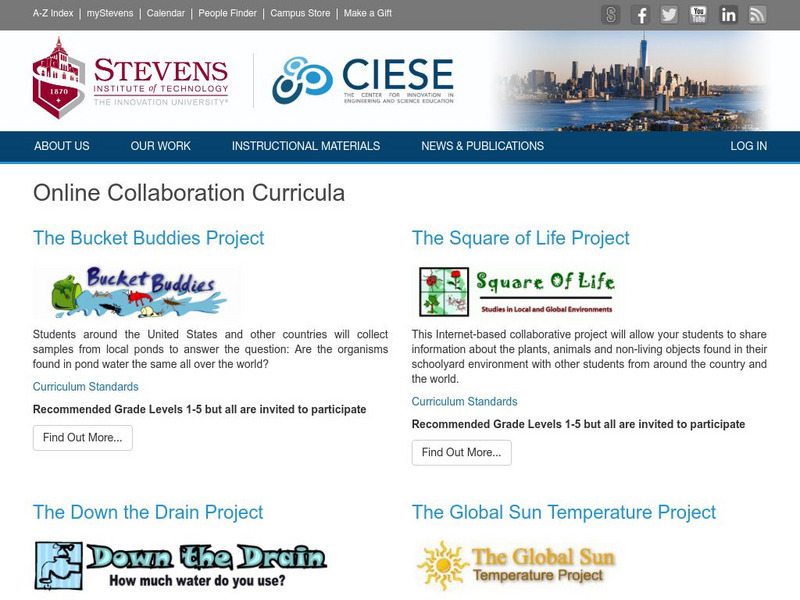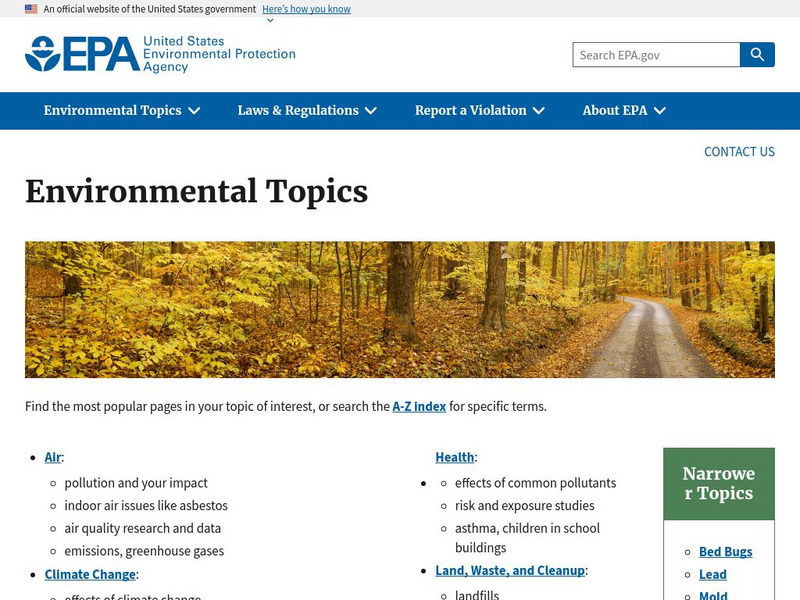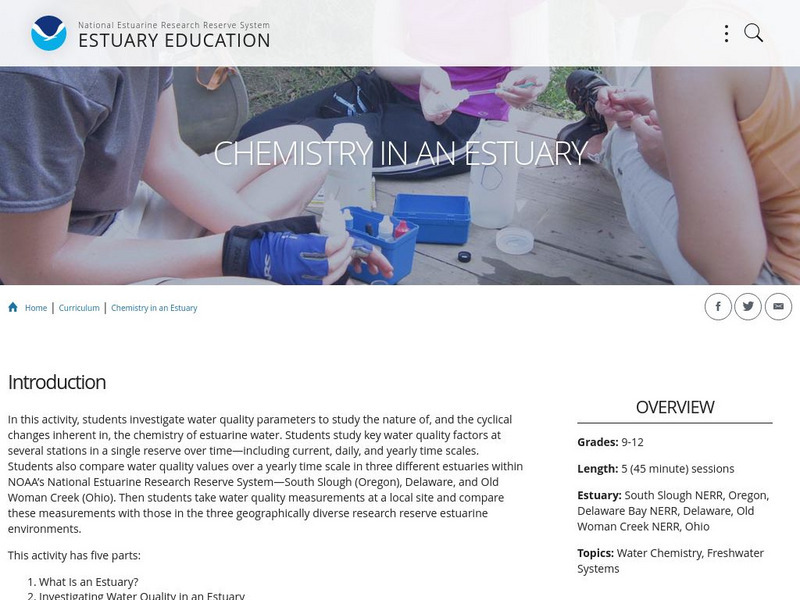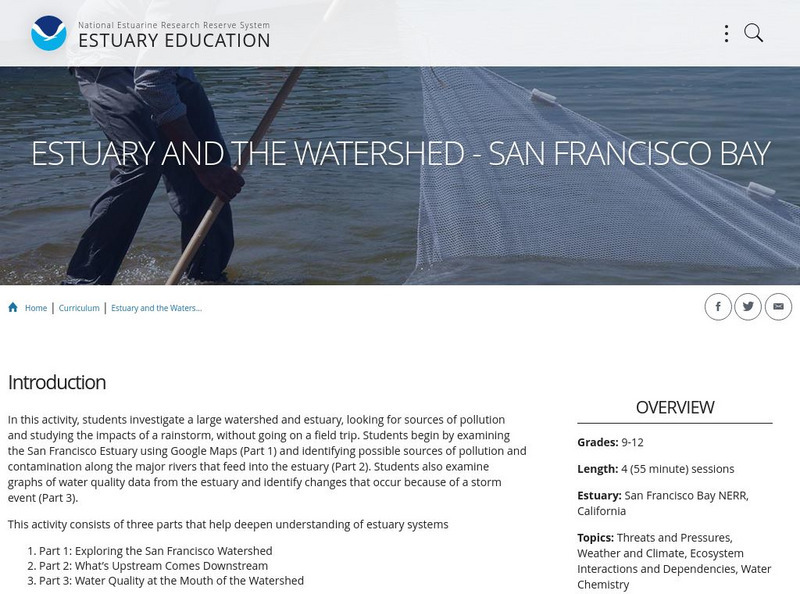Oxfam
Oxfam Education: Water
A great site from Oxfam which offers encourages critical thinking about water conservation through the use of pictures and student activities. Targeted to curriculum links for the United Kingdom, but information is certainly valuable and...
Smithsonian Institution
National Museum of Natural History: Ocean Planet: Water Pollution Toxic Materials
This site, from an archived Smithsonian exhibit, describes and illustrates the effects of toxic materials on wildlife in bodies of water.
US Geological Survey
U.s. Geological Survey: Water Resources of the United States
Visit the U.S. Geological Survey's website for a wide variety of information on water. Content includes data on water quality, water use, acid rain, among others; publications; information on water resource programs; maps; information on...
My Science Site
Environment Canada: Clean Water: Life Depends on It! [Pdf]
An extensive lesson unit on water quantity and quality and why it is important in relation to human life. Provides lessons that incorporate language, social studies, geography, and health. Tests are also provided. This is one chapter of...
US Environmental Protection Agency
Epa: Ground Water and Drinking Water
Learn about the safety of drinking water, find information on agencies that oversee our water, and gain access to the current drinking water standards and regulations.
Other
Icpdr: Ships and Environment to Share Danube River
This is a comprehensive analysis of the importance of the Danube River Basin and ways to balance human and ecological needs in the basin. The reason behind this study is the European Union's move to open shipping lanes in the Danube and...
Other
Uk Rivers Network: Finding Out About Water Pollution
Excellent site covers all types of water pollution. Hundreds of links including books, articles, organizations, specific topics.
NOAA
Noaa: Chesapeake Bay Interpretive Buoy System: Data in the Classroom
NOAA Smart Buoys collect and transmit real-time weather, water conditions, and water quality data. Chesapeake Exploration gives teachers and their students unprecedented access to lessons designed around real-time observational data from...
NOAA
Noaa: Estuaries 101 Curriculum: Extreme Weather and Estuaries
Students investigate how hurricanes can affect National Estuarine Research Reserve System estuaries. This activity consists of 2 parts which help deepen understanding of estuarine systems: Investigating an Estuary and Impact of Extreme...
NOAA
Noaa: Estuaries 101 Curriculum: Human Impact on Estuaries
Students will make a model of a pollution spill that occurred at Bangs Lake, a tidal lake within the Grand Bay National Estuarine Research Reserve in Mississippi, in April 2005, and measure water quality parameters in their model....
Center for Innovation in Engineering and Science Education, Stevens Institute of Technology
Ciese Collaborative Projects: The Global Water Sampling Project
By testing your local water quality, you will be able to compare your results with students around the world. Register your class, and follow the project instructions. Additional teacher resources, references, and Ask-an-Expert sources...
Center for Innovation in Engineering and Science Education, Stevens Institute of Technology
Ciese: Collaborative Projects
Using a variety of science topics, these projects link your class with classes around the world in data collection and analysis. There are projects recommended for all grade levels. Begin dates and end dates are listed to help in...
US Geological Survey
Usgs: Ground Water: Wells
Wells are extremely important to all societies. Find out how wells are dug today and peruse the list of the different types of wells and the methods used to dig them. Click Home to access the site in Spanish.
National Wildlife Federation
National Wildlife Foundation: What We Do to Protect the Great Lakes
A description of the various projects of the National Wildlife Foundation to protect the Great Lakes. Includes links to further information.
US Environmental Protection Agency
Epa: Important Issues
This official site for the EPA describes the issues of the day. Learn about topics such as water, air, climate, wastes and pollution, green living, and more. Find important ways that you can get involved in protecting the environment.
Utah Education Network
Uen: Water Pollution Graphing: Bugs Don't Bug Me
Activity shows the link between land use activities within a watershed and water quality.
Utah Education Network
Uen: If Bugs Could Talk Bugs Don't Bug Me
Evaluate the quality of a "water sample" and form a hypothesis about the land use near the location their "water sample" was collected.
Utah Education Network
Uen: Macroinvertebrate Investigation
Introduces students to living aquatic macroinvertebrates.
NOAA
Noaa: Estuaries 101 Curriculum: Chemistry in an Estuary
This activity introduces students to the complex chemistry of estuarine water. Students investigate how chemical and physical water quality factors-pH, temperature, dissolved oxygen, and salinity-change and interact over varying time...
NOAA
Noaa: Estuaries 101 Curriculum: Estuary and the Watershed San Francisco Bay
In this activity, students investigate a large watershed, look for sources of pollution in the watershed, and study the impacts of a rain storm on a watershed and estuary, without going on a field trip. Students investigate the nature of...
Globe
The Globe Program: Water Module
Learning activities allow students to learn about tools for making science observations such as a magnifying lens and ruler. Then students describe how macroinvertebrates are adapted to their aquatic environment.
BSCS Science Learning
Bscs: Chesapeake Bay Algal Blooms
In this inquiry, students engage with mapping data to determine what kind of land coverage is contributing the most to harmful algal blooms in the Chesapeake Bay Watershed. Click on the link for teacher resources for teaching guides and...
BSCS Science Learning
Bscs: Asking and Answering Questions With Data
This inquiry is intended to provide students with practice developing investigable questions that need data, and specifically large datasets, to be answered. Click the teacher resources link for teaching guides and student handouts.
Other
Bscs: Asking and Answering Questions With Data
In this self-directed lesson, students use graphs and maps of water quality to investigate relationships between variables to answer questions. A handout with everything the student needs to complete this lesson is available as a PDF or...





![Environment Canada: Clean Water: Life Depends on It! [Pdf] Lesson Plan Environment Canada: Clean Water: Life Depends on It! [Pdf] Lesson Plan](https://d15y2dacu3jp90.cloudfront.net/images/attachment_defaults/resource/large/FPO-knovation.png)
